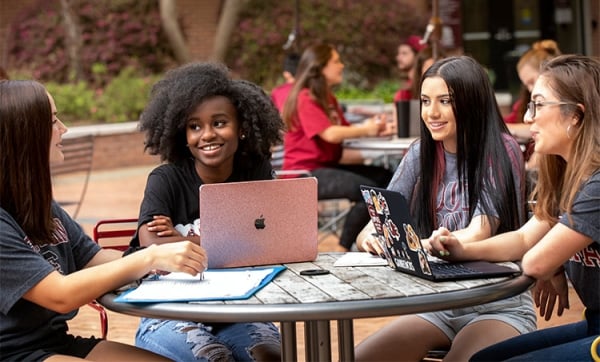First-generation students make up around 20 percent of the University of South Carolina student population.
University of South Carolina
While first-generation students are a growing population in higher education, they remain less likely to retain or complete a credential, compared to their continuing-generation peers.
A new initiative at the University of South Carolina unifies assistance for students who are the first in their families to attend college to guide them through the university and provide a sense of belonging. The First-Generation Student Center is connected to a first-generation living-learning community and offers embedded academic and socioemotional support, which reduces the need for students to seek support independently.
What’s the need: USC serves a large number of first-generation learners—one in five undergraduate students or around 6,000 individuals.
“We know from our campus data on students in our long-standing TRIO program that they do not have the gaps in retention and graduation that our other first-generation students have,” says Shelley Dempsey, assistant provost for graduation and retention. “However, the program is at max capacity. It was time for our university to provide additional options to serve students in a similar demographic who are not able to be a part of the TRIO program.”
The center was designed to provide increased and more specialized services for learners in a physical space that promotes students’ feelings of belonging.
Dempsey sees particular benefits with first-generation student support, including social capital growth and impacting future generations of their families. But Dempsey also notes improving processes and the student experience for first-generation degree attainment is a benefit for the institution as a whole.
How it works: The First-Generation Center (FGC), which opened in fall 2024 within Maxcy College residence hall on campus, includes a variety of support services and resources.
A dedicated director and assistant director support the center, as does a faculty director, who oversees the living and learning community for 151 first-generation students.
Within the center, students can engage with an embedded mental health counselor for one-on-one in-person or virtual sessions, as well as group sessions on common themes like homesickness and exam anxiety. The Student Success Center has embedded staff presence for drop-in hours, and the FGC hosts other partners across campus, including financial aid, the career center and the meal card office, to provide insights into navigating higher ed.
“The idea is that if we can have all of these offices have a presence in the FGC as a safe space, then we build comfort and confidence with the first-generation students to utilize them in their locations outside the FGC as well,” Dempsey says.
This fall, the center hosted a series called First-Gen Connections that provided relevant information related to campus experiences and deadlines. Athletics staff led a discussion on how students can earn ticket priority for sporting events and offered students a behind-the-scenes tour of the football stadium, for example.
How it’s going: Since launching the center, USC leaders have seen an increase in first-generation student involvement. The center was advertised through meetings, events and campus media including newsletters, but word of mouth has been the most effective marketing campaign.
Several sections of University 101, USC’s first-year seminar program, also meet in the center, which helps raise awareness of the support offerings.
This fall, efforts to include first-generation students were noticeable in mini-grant applications for research and creative projects alongside a mentor, with 55 percent of applicants being first-gen learners.
“We want our first-generation students to know that they are just as capable, and sometimes that takes bringing the info to them in a designated space so that they don’t have to navigate the large university and unfamiliar lingo or jargon for themselves,” Dempsey says.
What’s next: The current target is incoming and first-year students, with the hopes of continuing to involve them as they progress through the institution, but administrators hope to reach graduate students, as well.
“We are in the process of conducting a needs assessment to know how to increase our supports going forward,” Dempsey says.
The university will also track other student metrics including involvement in high-impact practices, GPA, DFW rates, campus involvement and leadership opportunities. Additionally, leaders will compare utilization of support services among first-gen students who engage with the center compared to their peers who are also first-gen but not associated with the center.
If your student success program has a unique feature or twist, we’d like to know about it. Click here to submit.








